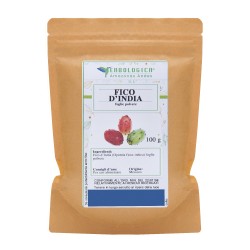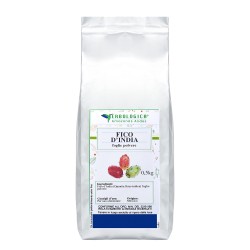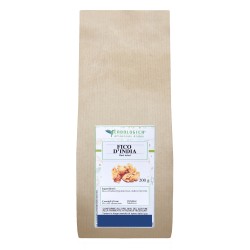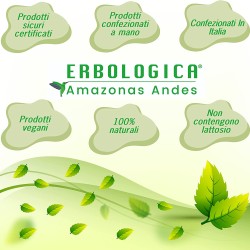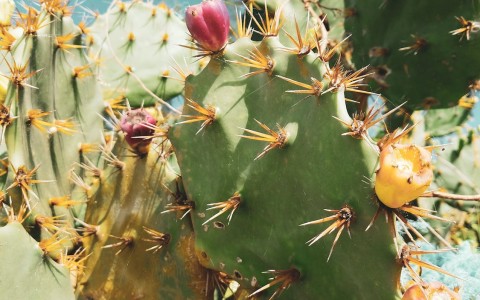
Spesso si associa il fico d'India al dessert o a qualcosa di dolce.
Da secoli si usa il fico d'India per scopi medicinali.
Infatti, il fico d'India contiene più vitamina C degli agrumi, oltre a una buona quantità di fibre e antiossidanti.
L'erba offre anche diverse vitamine e minerali, come la vitamina A, B1, B2, B6 e l'acido folico.
Benefici per la salute
La tisana di fico d'India è ricca di vitamina C, fondamentale per la formazione del collagene.
Il collagene è la proteina che ci tiene uniti: mantiene la pelle idratata e liscia, le articolazioni flessibili e i vasi sanguigni sani.
Il fico d'India è anche un'ottima fonte di betacarotene, che il nostro organismo trasforma in vitamina A.
La vitamina A è essenziale per una buona vista e una pelle sana.
Il fico d'India può anche aiutarci a rimanere energici, in quanto è ricco di vitamine del gruppo B.
Le vitamine del gruppo B aiutano il nostro organismo nel metabolismo e nella produzione di energia.
Il fico d'India è anche ricco di minerali come il ferro e il magnesio, che ci aiutano a mantenerci idratati e in salute.
Il magnesio è particolarmente importante per chi soffre di stanchezza cronica.
Il fico d'India fornisce anche una buona quantità di fibre, fondamentali per un intestino sano.
Le fibre sono importanti anche per la perdita di peso, in quanto mantengono il senso di sazietà più a lungo.
Il fico d'India è consigliato a chi vuole perdere qualche chilo.
Il fiore contiene una buona quantità di fibre, che aiutano la digestione, prevengono la stitichezza e favoriscono la perdita di peso.
L'erba è anche povera di calorie, il che significa che può essere una buona aggiunta a un piano alimentare per la perdita di peso.
Alcuni studi hanno anche scoperto che l'estratto di fico d'India può contribuire ad aumentare il metabolismo dell'organismo.
Il fico d'India è anche ricco di antiossidanti, che aiutano l'organismo a smaltire i grassi in eccesso.
Gli antiossidanti possono anche aiutare a prevenire l'invecchiamento della pelle e a mantenere in salute le articolazioni.
Proprietà antinfiammatorie
Il fico d'India è ricco di acidi fenolici, che si trovano anche in altre erbe, frutta e verdura.
Gli acidi fenolici sono acidi organici che hanno proprietà antiossidanti e hanno dimostrato di avere proprietà antinfiammatorie.
Il fico d'India contiene cactus-opina, una sostanza naturale che ha proprietà antinfiammatorie e può contribuire ad alleviare il dolore.
L'erba può essere utile per chi soffre di dolori articolari, artrite, gonfiore e mal di testa causati dall'infiammazione.
Gli acidi fenolici sono utilizzati anche nella produzione di alcuni farmaci, il che significa che la tisana di fico d'India può essere utile per il trattamento di alcune patologie.
Gestione del diabete
Alcuni studi hanno dimostrato che l'estratto di fico d'India può essere utile per gestire i livelli di zucchero nel sangue.
Tuttavia, sono necessarie ulteriori ricerche prima di poter affermare con certezza che l'erba è efficace per questo uso.
Il fico d'India contiene diverse vitamine e minerali, come la vitamina B1, B2, B6 e l'acido folico.
Queste vitamine e minerali sono fondamentali per la regolazione degli zuccheri nel sangue e vengono spesso prescritte a chi soffre di diabete.
Altri benefici
La tisana di fico d'India può aiutare a perdere peso, fornendo molte vitamine, minerali e antiossidanti.
Il fiore può anche aiutare a combattere le infiammazioni e a rafforzare il sistema immunitario.
Il fico d'India fornisce anche una buona quantità di fibre, che possono aiutare a mantenere il senso di sazietà più a lungo.
Il fico d'India è ricco di vitamina C, fondamentale per la formazione del collagene.
Il collagene è la proteina che ci tiene uniti: mantiene la pelle idratata e liscia, le articolazioni flessibili e i vasi sanguigni sani.
Il fico d'India è anche un'ottima fonte di betacarotene, che il nostro organismo trasforma in vitamina A.
La vitamina A è essenziale per una buona vista e una pelle sana.
Il fico d'India può anche aiutarci a rimanere energici, in quanto è ricco di vitamine del gruppo B.
Le vitamine del gruppo B aiutano il nostro organismo nel metabolismo e nella produzione di energia.
Il fico d'India è anche ricco di minerali come il ferro e il magnesio, che ci aiutano a mantenerci idratati e in salute.
Il magnesio è particolarmente importante per chi soffre di stanchezza cronica.
Come preparare la tisana ai fiori di fico d'India?
La tisana di fico d'India è facile da preparare e può essere realizzata con o senza fiori.
Se si coltivano cactus di fico d'India, si possono cogliere i fiori prima che si trasformino in frutti.
Se acquistate un cactus di fico d'India, assicuratevi che sia pulito prima di utilizzarlo.
Conservate il fico d'India fresco in frigorifero e utilizzatelo entro pochi giorni.
Per ottenere risultati migliori, utilizzate i fiori di fico d'India freschi durante i mesi estivi.
Se vivete in una zona più fredda e volete raccogliere il fico d'India in inverno, cercate il fico d'India essiccato.
Per preparare una tisana al fico d'India, aggiungete quattro o cinque fiori a una tazza di acqua bollente.
Lasciate in infusione la tisana per quattro o cinque minuti e poi filtratela.
Per addolcire la tisana si può aggiungere un cucchiaino di miele o di stevia.
Effetti collaterali
Le donne in gravidanza e in allattamento dovrebbero evitare di consumare il cactus del fico d'India.
Il fiore è inoltre sconsigliata ai bambini di età inferiore ai 12 anni.
Gli effetti collaterali del consumo di fico d'India includono crampi addominali, mal di testa e diarrea.
Alcune persone possono anche manifestare reazioni allergiche come prurito e gonfiore del viso, della bocca e della lingua.
Consigli per una raccolta di successo del cactus di fico d'India
I cactus di fico d'India crescono in climi caldi e secchi.
Hanno grandi cuscinetti e spine di forma ovoidale, spesso di colore rosso.
I cactus di fico d'India sono facili da coltivare, a patto che si scelga il posto giusto per piantarli.
Il fico d'India cresce meglio nei climi caldi e secchi, come i deserti degli Stati Uniti sud-occidentali e del Messico e del sud d'Italia
Il cactus preferisce terreni porosi e poco fertili, ma può essere coltivato anche in terreni sabbiosi o rocciosi.
Il periodo migliore per la raccolta del fico d'India va da settembre a giugno.
Il fico d'India può essere raccolto a partire dai due anni di età.
Quando si raccoglie il fico d'India, bisogna fare attenzione a non toccare il cactus con le mani, perché si rischia di essere punti dagli aculei.
Utilizzate invece guanti da giardinaggio o pinze.
Parole finali
La tisana al fico d'India è un'ottima bevanda per chiunque voglia mantenersi in salute.
L'erba è ricca di vitamine e minerali, oltre che di antiossidanti, il che significa che può aiutare a risolvere molti problemi di salute.
Se volete trarre i benefici del cactus del fico d'India, potete raccogliere i cactus dal vostro giardino o acquistarli online.
Il fico d'India è facile da coltivare in climi caldi e secchi e può essere raccolto a partire dai due anni di età.
La tisana al fico d'India è un'ottima bevanda per chiunque voglia mantenersi in salute.
Il fiore è ricca di vitamine e minerali, oltre che di antiossidanti, il che significa che può aiutare a risolvere molti problemi di salute.
Tuttavia, questo cactus ha molti usi oltre a quello di essere un frutto gustoso.


